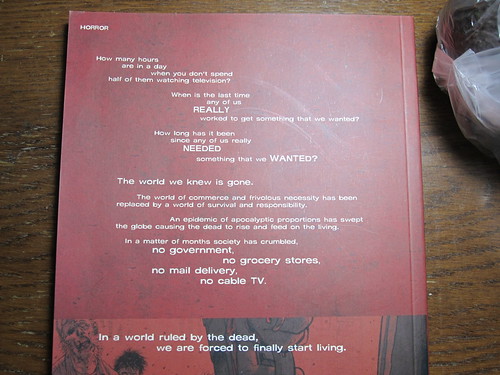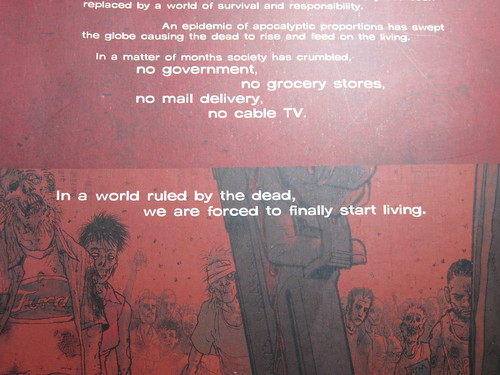New York Times Publishes Ill-Informed Anti-Zombie Screed
It’s to be expected, though not of course approved of, that The Walking Dead’s enormous commercial success will cause a certain amount of navel-gazing and faux-introspection on the part of the Mainstream Media, attempting to explain its own staggering financial haul even as their various media platforms fade into increasing obsolescence in the post-modern era.
Still, this NYT Television section piece attempting to discern the origin of the ‘appeal’ of Zombie hating fiction was particularly clumsy and offensive.
Next thing you know, NPR and the NYT will join forces. At least this article, being mostly (offensive, Living Supremacist) opinion, has fewer gross factual errors.
Some lowlights:
ZOMBIES are a value stock. They are wordless and oozing and brain dead, but they’re an ever-expanding market with no glass ceiling. Zombies are a target-rich environment, literally and figuratively. The more you fill them with bullets, the more interesting they become. Roughly 5.3 million people watched the first episode of “The Walking Dead” on AMC, a stunning 83 percent more than the 2.9 million who watched the Season 4 premiere of “Mad Men.” This means there are at least 2.4 million cable-ready Americans who might prefer watching Christina Hendricks if she were an animated corpse.
…
Mainstream interest in zombies has steadily risen over the past 40 years. Zombies are a commodity that has advanced slowly and without major evolution, much like the staggering creatures George Romero popularized in the 1968 film “Night of the Living Dead.” What makes that measured amplification curious is the inherent limitations of the zombie itself: You can’t add much depth to a creature who can’t talk, doesn’t think and whose only motive is the consumption of flesh. You can’t humanize a zombie, unless you make it less zombie-esque. There are slow zombies, and there are fast zombies— that’s pretty much the spectrum of zombie diversity. It’s not that zombies are changing to fit the world’s condition; it’s that the condition of the world seems more like a zombie offensive. Something about zombies is becoming more intriguing to us. And I think I know what that something is.
Zombies are just so easy to kill.
Let’s start with the obvious: the author who wrote this (Chuck Klosterman, author of ‘Eating the Dinosaur) has obviously paid very little attention to Zombie media. The assertion that the depiction of Zombies in fiction (leaving aside their actual treatment by society) has little changed little since Night of the Living Dead is strange, to say the least, especially since the Zombie phenomenon in American pop culture started decades before Night (with films like White Zombie, King of the Zombies, Revolt of the Zombies, etc). After Romero and Russo cobbled together a new variety of hate on-screen, it’s true that American film tended to ape their materialistically oriented design, for a while. It’s also true that Romero and Russo had a major falling out, and that Russo’s subsequent movies (Return of the Living Dead and its ilk) feature very different forms of the Undead, who, contra Mr. Klosterman, are capable of thinking, planning, working in groups, even, and famously, talking.
I mean, is he unaware of the ‘braaaaaaains’ stereotype? Really?
The fast zombie/slow zombie divide is, as I have discussed before on the blog, mostly an American phenomenon. European Zombie stereotypes never got hung up on the ground speed of their villains; in European Anti-Zombie film, the ‘Zombies’ can use mass transit, boats, or even provide their own, presumably Zombified, horses (Tombs of the Blind Dead and its sequels are somewhat famous for this).
More importantly for the ZRC, depictions of the Differently Animated ARE changing, and sometimes for the better. Movies like Shaun of the Dead made token gestures at what Klosterman calls ‘humanizing’ the Undead (who, already being humans, hardly need it); indie film has gone considerable further, with George’s Intervention being amongst the ZRC’s standout favorites.
Let’s move to the core premise of Mr. Klosterman’s argument: Zombies are popular because they are (on screen) easy to kill:
A lot of modern life is exactly like slaughtering zombies.
IF THERE’S ONE THING we all understand about zombie killing, it’s that the act is uncomplicated: you blast one in the brain from point-blank range (preferably with a shotgun). That’s Step 1. Step 2 is doing the same thing to the next zombie that takes its place. Step 3 is identical to Step 2, and Step 4 isn’t any different from Step 3. Repeat this process until (a) you perish, or (b) you run out of zombies. That’s really the only viable strategy.
Every zombie war is a war of attrition. It’s always a numbers game. And it’s more repetitive than complex.
I trust you, astute readers that you are, see where this is going: the old saw that ‘Modern Life Makes Us Into Zombies’
In other words, a not-entirely-dissimilar argument to the one we took issue with from NPR. Here, instead of technological alienation being to blame though, it’s rote, repetitive tasks, which, ironically, are the things computers are best at performing and removing from dependence on human labor. So the same end-result is obtained from the exact opposite socio-technological phenomenon.
Consistency never has been the strong suit of the Anti-Zombie faction.
Klosterman again:
In other words, zombie killing is philosophically similar to reading and deleting 400 work e-mails on a Monday morning or filling out paperwork that only generates more paperwork, or following Twitter gossip out of obligation, or performing tedious tasks in which the only true risk is being consumed by the avalanche. The principal downside to any zombie attack is that the zombies will never stop coming; the principal downside to life is that you will be never be finished with whatever it is you do.
You know that you’ve led a pretty sheltered existence when you compare, even humorously, following Twitter with the end of the world and downfall of all civilization, commonly the outcome of these Anti-Zombie media products. Honestly? The principal downside to life is that you will never be finished with.. living?
Well, you know, it’s impossible to successfully punish a suicide, Mr. Klosterman. Attendance of this ‘life’ thing is strictly optional.
At heart the Klosterman argument is that we find Zombie movies appealing because the threat they present is manageable and vaguely similar to the threat of a full email inbox, and that therefore, we can triumph over these woes vicariously on screen before dealing with them in real life at home.
Yeah… not buying it. For one thing, most Zombie movies end with the principal cast having either lost utterly, or having been driven to the brink of destruction. Very few show any sort of triumph of the Living, and those that do usually have it leavened by tragedy or delivered by an outside force that rescues the protagonists. Romero’s body of work in particular has an extreme misanthropic edge, arguing that we are too screwed up and self-destructive as a society, if not a species, to survive the application of moderate outside pressure. Robert Kirkman, whose Walking Dead franchise this NYT column ostensibly discusses, has a very similar view, and his argument against human resilience and the ‘normalcy’ of the Zombie Apocalypse is made explicitly on the COVERS TO THE WALKING DEAD TRADE PAPERBACKS:
Ahem. I’m sorry, but, once again, we’re arguing not about subtext, but about text, and once again, the mainstream press and its hired guns Did Not Do the Research. The central premise of The Walking Dead is, in fact, that modern life, with its superficiality and shallowness, is completely unlike survival in the Zombie Apocalypse. In order to help you understand that point, without even having read a single page or purchased a single volume or seen a single episode, they printed it on the outside of the books, in fairly large font.
Repeatedly.
Yeesh.
Attention Mainstream Press Outlets: The Zombie Rights Campaign is available to write general interest articles on the Zombie cultural phenomenon! We, unlike the people you’ve been going to lately, actually know a few things about the history of Zombies and American pop culture.
Further the ZRC will donate any fees for such general information pieces to charity, because, quite frankly, you’ve been part of the problem (to date) and your money’s not clean.




Comments